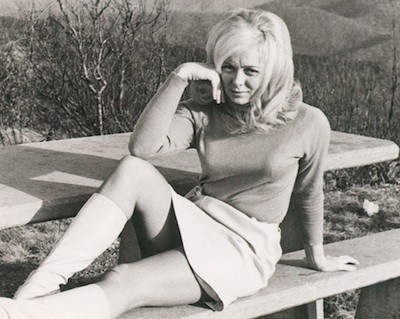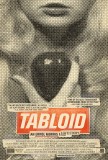| Reviews & Columns |
|
Reviews DVD TV on DVD Blu-ray 4K UHD International DVDs In Theaters Reviews by Studio Video Games Features Collector Series DVDs Easter Egg Database Interviews DVD Talk Radio Feature Articles Columns Anime Talk DVD Savant Horror DVDs The M.O.D. Squad Art House HD Talk Silent DVD
|
DVD Talk Forum |
|
|
| Resources |
|
DVD Price Search Customer Service #'s RCE Info Links |
|
Columns
|
|
|
Tabloid

In September of 1977, a young Mormon named Kirk Anderson went missing from a Church of Jesus Christ of Latter Day Saints in England, where he was working as a missionary. A few days later, he contacted police, and reported that he had been abducted by Joyce McKinney, a former beauty queen he had dated back in the States. Anderson claimed that McKinney and her accomplice had taken him to a remote cottage and imprisoned him, and that McKinney, after failing to seduce him, had raped him several times. McKinney claimed that she had helped him escape from the Mormon "cult," and that they had enjoyed a romantic weekend together before his Mormon guilt sent him back to the church, which forced him to lie about the encounter.
These are, it seems, categorically opposite descriptions of the same event, told with equal force and vigor--a salacious, sensationalistic version, and a flowery, romantic one. Who the hell is our reliable source here? And with that question, we're getting into Errol Morris territory.
McKinney and her story, which became a sensation in late-70s English newspapers, is the subject of Morris's new film Tabloid. It is not one of the director's best films--there is less urgency and momentum, less at stake than in The Fog of War or The Thin Blue Line or Standard Operating Procedure, and he tends to flourish in approaching Big Subjects. But second-tier Morris is still Morris; it is a peculiar and riveting picture all the same.
Though Anderson declined to be interviewed (perhaps understandably), Morris talks to Peter Tory, a gossip columnist for the Daily Express and Kent Gavin, a photographer for the Daily Mirror, to get the tabloid side; Tory Williams, a former missionary and Salt Lake City radio host; Jackson Shaw, the fixed-wing pilot who got out of the scheme before it got out of hand; and, most intriguingly, McKinney herself, a fascinating if fairly sad figure who is probably, in Tory's words, "barking mad."
True to Morris's style, this is not a standard, dull, talking-heads documentary; though he eschews his oft-deployed device of re-enactments, the film is filled with odd little detours, ingenious illustrations (including a new device of using headline-style on-screen graphics to highlight keywords, attribute credit, and act as commentary), and weird archival footage. The film begins with a strange and mannered McKinney reading from the "pending book A Very Special Love Story," which recasts her story as the tale of a fairy tale princess (the footage was shot by Trent Harris, known among film cultists for his Beaver Trilogy); towards the end, there is an odd piece of home video footage that McKinney shot to illustrate the disruptiveness of a neighbor's barking dog. But she keeps starting over, doing retakes, obsessively re-shooting it. The effect is haunting. Morris leaves it all in.
Likewise, his interviews tend to hold a beat longer, letting a reaction fill in the blanks. Sometimes it's innocent (and amusing), like the little grin on Shaw's face after he describes McKinney's see-through blouse. And sometimes it's disturbing, like the way Gavin chuckles about her suicide attempt after the story began to grow hair--mainly because of his breathless uncovering of her sketchy past.
And then there is McKinney herself. She's clearly, to some degree, delusional--and not just based on her long, strange tale ("I don't see any connection at all between cloned puppies and a 32-year-old sex slave story," she insists, and you wouldn't think there would be), but in the slightly off-kilter way she tells it. In her current interviews, poised and still sporting her Southern accent, she can be funny--she says that trying to her trying to rape Anderson would be "like puttin' a marshmellow in a parkin' meter"--and even charming. But there's something intangibly not right about her, about how she insists that sex with "my Kirk" was "a melding of two souls," how she insists, even today, that "I'll die loving him" because she is "an incurable romantic." How does Morris see her? How is he approaching her? Is he laughing at her?
Tantalizingly, it is as impossible to tell that as it is to tell what actually happened in that cottage in Devon. Williams--the closest thing we have to a voice of reason--lays out Anderson's claims as "Story #1," McKinney's fairy tale as "Story #2," but proposes "a third scenario: something in between." Only those who were there really know, and they're not telling. Midway through the film, McKinney says, "You know, you can tell a lie long enough, until you believe it." She's talking about Kirk there, but she's saying much more.
Jason lives in New York. He holds an MA in Cultural Reporting and Criticism from NYU.
|
| Popular Reviews |
| Sponsored Links |
|
|
| Sponsored Links |
|
|
| Release List | Reviews | Shop | Newsletter | Forum | DVD Giveaways | Blu-Ray | Advertise |
|
Copyright 2024 DVDTalk.com All Rights Reserved. Legal Info, Privacy Policy, Terms of Use,
Manage Preferences,
Your Privacy Choices | |||||||










